Rod Miller's Blog, page 16
December 6, 2019
Playing the slots.

Southern Utah is a red rock wonderland. Soaring cliffs. Plunging gorges. Pinnacles and buttes and mesas and canyons. There are more places that can take your breath away than you can possibly see in a lifetime—let alone a couple of days.A few weeks ago I had the pleasure of once again teaching at the Kanab Writers Conference. While I have been fortunate to be a part of several conferences in several places, Kanab is always a favorite. After the conference, we made our way across the Arizona Strip, dropped off the mesa back into Utah and St. George, then drove north of town a few miles to Snow Canyon State Park. We had been there before, and it was time for another visit. An unforgettable recollection, Jenny’s Canyon, surpassed the memory. A short, easy path off the road leads to a red rock cliff and into a small slot canyon. The photo above shows the entrance. The canyon walls, that can be spanned with both hands in places, reach skyward, limiting light to a narrow strip of sky. Much of the rock is “honeycombed” with fissures and holes and clefts and crevices that inspire wonder.It’s a small wonder, as wonders go in this part of the West. But it is still wonderful.
Published on December 06, 2019 12:16
November 28, 2019
Giving thanks.
 Today is the day set aside to do something we should do every day—give thanks for all the blessings we enjoy just for being alive. Things that are ours through no effort of our own. Things that should remind us that while the world may not owe us a living, it provides one anyway.I am grateful today, as always, for the alphabet.The twenty-six letters, symbols, scribbles, given to us who use American English have provided me a long life of education, employment, and entertainment. Numbers and I do not get along. But the alphabet, and all that comes from it, is an ever-present friend and companion. Just think of a world without the ability to share thoughts, feelings, ideas, knowledge, and more through a written language. It is beyond contemplation.Despite the occasional quirks and complications inherent in using our alphabet, and despite the hatred, lies, and cruelty some fashion from it, I am thankful today for the wonder of the alphabet and the many miracles it lavishes on my life.I hope I remember that tomorrow.
Today is the day set aside to do something we should do every day—give thanks for all the blessings we enjoy just for being alive. Things that are ours through no effort of our own. Things that should remind us that while the world may not owe us a living, it provides one anyway.I am grateful today, as always, for the alphabet.The twenty-six letters, symbols, scribbles, given to us who use American English have provided me a long life of education, employment, and entertainment. Numbers and I do not get along. But the alphabet, and all that comes from it, is an ever-present friend and companion. Just think of a world without the ability to share thoughts, feelings, ideas, knowledge, and more through a written language. It is beyond contemplation.Despite the occasional quirks and complications inherent in using our alphabet, and despite the hatred, lies, and cruelty some fashion from it, I am thankful today for the wonder of the alphabet and the many miracles it lavishes on my life.I hope I remember that tomorrow.
Published on November 28, 2019 06:21
November 20, 2019
My Favorite Book, Part 21.
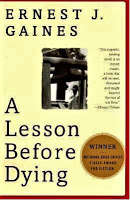
A couple of weeks ago, while driving somewhere, I heard on the radio that Ernest J. Gaines died. Hearing his name immediately called to mind A Lesson Before Dying, a novel I have read and re-read.Most of what I write about relates to the American West. I make an exception here because this book is an exception—in that it is better, much better, than most of the books ever written in the world. It tells the story of a man accused, tried, and convicted of murder, and sentenced to die for a crime in which he played no part, other than being in the wrong place at the wrong time. The man is poor and uneducated, and the attorney assigned to defend him did so on the basis that the defendant’s ignorance and mental capacity made him little more than an animal. Well, two old women are not having it. They want him to die like a man, not an animal. So, they convince an unwilling school teacher to visit the prison and educate the condemned man. The two men become friends, more than friends, and strengthen one another as execution day draws ever nearer. A Lesson Before Dying is a gripping, heart-wrenching book more than worthy of the acclaim and awards it earned the author. It will haunt you for years. At least it has me.
Published on November 20, 2019 11:48
November 11, 2019
See page 48.
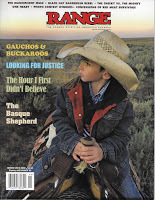 The Winter 2019/2020 issue of range magazine is hitting the streets. On the cover, among other things, it says “One Heart” and “Gauchos & Buckaroos.” Both refer to a story I wrote that opens on page 48 of the magazine.Featured in the article are two artists: Carlos Montefusco and Jeff Wolf. Carlos is from Argentina, where he has enjoyed a long reputation as a painter of the gaucho, the cowboy of his country. Jeff is a sculptor famed for his works of art depicting the buckaroo culture among American cowboys. The two have become friends, brothers even, as they have explored rural life in their respective countries, and shared knowledge and history and meaning. Find a copy of range and read all about it. It is an inspiring story of two artists who share one heart.
The Winter 2019/2020 issue of range magazine is hitting the streets. On the cover, among other things, it says “One Heart” and “Gauchos & Buckaroos.” Both refer to a story I wrote that opens on page 48 of the magazine.Featured in the article are two artists: Carlos Montefusco and Jeff Wolf. Carlos is from Argentina, where he has enjoyed a long reputation as a painter of the gaucho, the cowboy of his country. Jeff is a sculptor famed for his works of art depicting the buckaroo culture among American cowboys. The two have become friends, brothers even, as they have explored rural life in their respective countries, and shared knowledge and history and meaning. Find a copy of range and read all about it. It is an inspiring story of two artists who share one heart.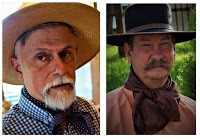
Published on November 11, 2019 08:15
October 31, 2019
Really Stupid Words, Chapter 9.

With the Major League Soccer season wrapping up, Major League Baseball wound up, the NBA ramping up, and the NFL in full swing, sports broadcasting is everywhere. Outside of soccer and rodeo, I am not that big a sports fan. But you can’t escape the stuff.Sports are, and always have been, a hotbed of buzz words, clichés, and meaningless commentary. So, in a sense, picking on them for that sort of thing isn’t fair.Then again, stupid words are stupid words, and deserve to be made sport of.There are two particular stupid words (one of them is actually two words, but some of the people enamored with them are writing them as one word now) that are particularly annoying.First of all, when was the last time you heard a sports organization referred to as a team? Not lately, would be my guess. Now, it’s a “franchise.” Not that sports teams bear any resemblance to the actual meaning of “franchise.” But, “franchise” has two syllables, whereas team has but one. Plus, it sounds highfalutin and important to the people who say it. They probably pat themselves on the back for their facility with language every time it comes out of their mouths (or keyboards).Then, there are fans. No team has fans anymore. Now, always, it is a “fan base.” Again, it is meaningless as used. True, a team may have a base of loyal, through thick-and thin, season-ticket-holding fans. But, now, everyone with even a casual interest is part of a “fan base” it seems.Stupid.
Published on October 31, 2019 05:38
October 22, 2019
A look into the future.
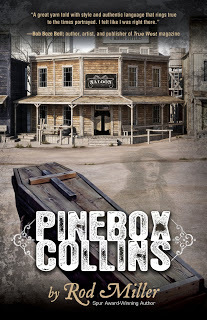
Five Star, publisher of several of my books, just sent the cover design for my forthcoming novel, Pinebox Collins.It’s about a one-legged itinerant undertaker in the Old West.From the battlefields of the Civil War, Jonathon “Pinebox” Collins wanders the West seeking his place in the world. Cow towns, mining towns, boomtowns, small towns, growing cities—he tries them all. Along the way, he witnesses what, where, and how the West changes America and the world. And he sees who makes it happen, crossing paths with pivotal people of the times. Among them, “Wild Bill” Hickok, whose trail repeatedly intersects with Pinebox’s. Pinebox Collins offers a unique view of the Old West, through the eyes of a man who looks death in the eye every day.The book is due for release in March 2020. Put it on your “to-do” list.
Published on October 22, 2019 05:51
October 14, 2019
14 reasons (minus 12) I write about the West.
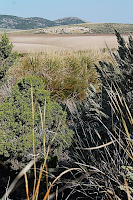
1. It is my homeland. I was born and raised in the West. After leaving my small Western hometown for good after graduating from college, I have lived in half a dozen or so other places. But all of them are Western places, either on one edge or the other of the Great Basin, or on the Snake River Plain. Raised among sagebrush and cedar trees (western juniper, if you’re a botanist), my eyes are accustomed to far horizons and wide skies. And while I enjoy visiting forested places and the confinement of wall-to-wall green-tinted shade, it is direct sunlight and hard-edged shadows that tell me I am at home.
2. The story of the West is the story of America and the American people. For centuries, the stories of the West were told by the many tribes and bands of Indians who were, and are, here. Later, the story took on a Spanish accent with the arrival of Spanish and Mexican colonizers. French inflections arrived with the trappers. And, since Europeans arrived on the east coast of the continent, there has been a yearning to go west, and west they came. The resulting clashes and collaborations that continue yet today created a place unlike any other on earth.
Whether it is writing history, fiction, poetry, or reporting the stories and lives of modern-day Westerners, there are stories to be told about the American West—and those stories will never run out. And, I believe, those stories can and will say more about the world than any other stories can tell.
Published on October 14, 2019 10:52
October 1, 2019
Remembering.

No one becomes a writer alone. Although it is a solitary pursuit, the pursuit of writing requires saddle pals to blaze the trail, to lead the way, to lend a hand. There have been many writers I consider saddle pals who have ridden off into that sunset of the great beyond. In one way or another, in ways large and small, they have helped me in my attempts to be a writer. And I will never forget that. Or them. Here are the names of some of those saddle pals. Some you may recognize, some not. But all are heroes in their own way—at least to me, and, I suspect, many others.· Dale Walker—historian, writer, and editor extraordinaire· Elmer Kelton—gentleman and all-time great Western writer· Dusty Richards—made a career of helping other writers find a career · Frank Roderus—ever encouraging, ever helpful, ever informative · Don Kennington—kind and considerate, talented beyond measure · Pat Richardson—rollicking rhymester steeped in wry humorEven though they are gone, for me they will never go away.
Published on October 01, 2019 09:14
September 22, 2019
Lies they tell writers, Part 51: Think positive.

I heard a lady say the other day that you have to think positive. That if you don’t think you can do something, you will never do it. She wasn’t talking about writing, but I have heard the same thing said about writing. Believe in yourself, don’t be critical of yourself, and that sort of thing. I disagree. I think writers should always doubt themselves. Always question themselves. Always wonder if the words they’ve just written are as good as they should be. To always worry that what they’ve written doesn’t cut the mustard. That kind of “negative” attitude, I believe, spurs us to try harder, to apply extra effort, and, ultimately, to write better.If a writer is willing to go the extra mile, to never rest, to bend over backward, to always challenge what’s on the page, that writer will surpass the “I think I can” attitude of the little engine that could, and become the writer who did. And, did it better.
Published on September 22, 2019 10:58
September 12, 2019
Off to college.
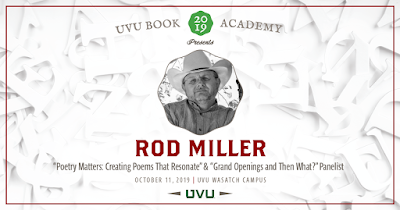
The Utah Valley University Book Academy is coming up. Friday, October 11, from 8:00 in the morning until 4:30, a bunch of writers of all kinds will host workshops, panel discussions, and other events to help aspiring authors find their way into and through the complicated world of writing and publishing books—and other media as well.I have been invited to sit on two panel discussions with other authors, one on writing poetry and another on writing effective opening lines for books or stories or whatever else you’re writing. The UVU Book Academywill be held at the UVU Wasatch campus in Heber City. If you’ve not visited the Heber Valley on the backside of Utah’s Wasatch Mountains, you’ve missed seeing one of the most beautiful places in our state—and there’s a lot of competition when it comes to beauty in Utah. If you’re in the vicinity, or can be, come join us at the UVU Book Academy.
Published on September 12, 2019 07:49



